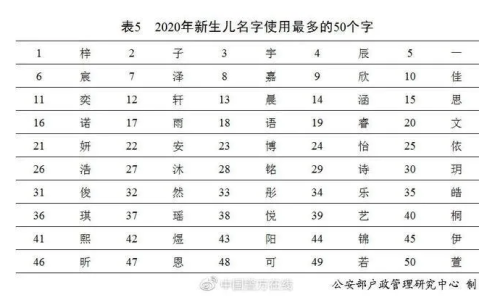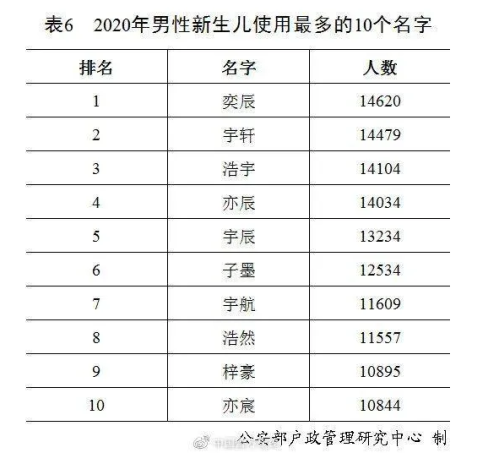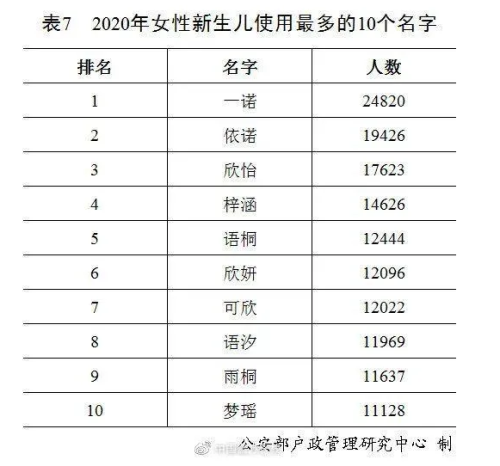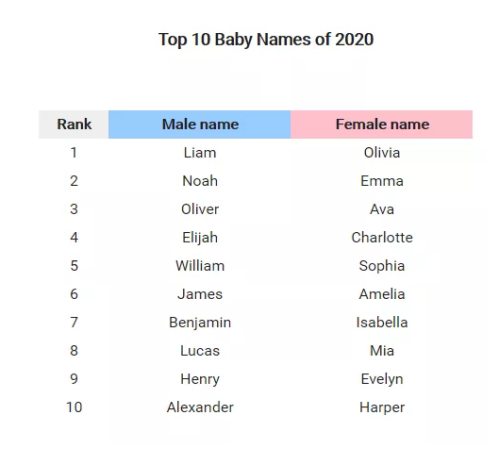不少人名都有着时代特征。新中国成立后的一段时间,名字中“解放”、“建国”、“卫国”都很常见。如今,“20后”的名字就更多元了。
公安部户政管理研究中心的数据显示,2020年新生儿名字中,“梓”、“宸”、“嘉”、“奕”、“涵”、“睿”等这些字频都排在前列。“奕辰”和“一诺”分别荣登男娃和女娃姓名榜首——有小说那味儿了。



类似地,大洋彼岸的美国新生儿名字也有着时间的烙印。埃默里大学商学院副教授Emily Bianchi研究了个人主义与经济状况的关系,研究显示:
During boom times, Americans tend to give their children more uncommon names, prize autonomy and independence in child-rearing, and favor music featuring self-oriented lyrics.
经济繁荣的时候,美国人爱给孩子取个性化的名字,看重孩子的独立自主能力的培育,爱听“自我向”的歌(歌词常见I, me, my这类词)。
Conversely, during recessions, Americans tend to focus more on fitting in, give their children more common names, listen to more relationally oriented music, and encourage their children to get along with others.
与之相反,美国人经济萧条时则更关注融入(群体),喜欢给孩子取常见的名字,爱听“关系向”的歌曲(歌词常见we, us, our这类词),鼓励孩子与他人好好相处。
Emily measured individualism by looking at social security data to see what parents named their kids during good and bad economic times.
艾米丽透过社会安全数据来研究个人主义,观察经济情况好时与差时父母给孩子们都取了什么名字。
Emily found that when the economy is doing well, parents are more likely to give their kids unique names — "I'm looking at you, Blue Ivy". When the economy is struggling, parents choose from a smaller set of more common names, which are often biblical names.
艾米丽发现,国家经济状况好时,父母更常给孩子取独特的名字——“我看着你呢!蓝常春藤”。如果经济状况不好,父母则会从一小组常见名字里给孩子选名字,通常是圣经里的名字。
注:美国歌手碧昂丝的女儿全名叫做Blue Ivy Carter,2020年8岁时作为史上第二年轻的获奖者获得格莱美奖。
It used to be that, in the 1950s, one out of 15 boys would receive the most common name. Fast forward to 2013, it was one out of 75 boys that receive the most common name of their birth year.
20世纪50年代,15个男孩里就有一个男孩会叫常见名。到了2013年,多达75个男孩里才会有一个叫常见名。
经济境况好的时候,美国人取名的花样非常多。美国社会安全局2019年的数据显示年轻宝爸宝妈们取名时从流行文化、文学、乃至食物和州名/城市名里汲取了不少灵感。
Parents draw baby name inspiration from a variety of sources — family history, pop culture, literature and even food. For many, geography offers meaningful ideas. Many parents are picking the names of US states and capital cities.
父母们从各种各样的来源——家族历史、流行文化、文学甚至食物——中获得婴儿名字的灵感。对许多人来说,地理领域有不少有意义的名字。许多家长常挑选美国各州和首府的名字作人名。
 [Photo/Pexels]
[Photo/Pexels]
地名
Arizona 亚利桑那
Carolina 卡罗莱纳
Dakota 达科塔
Montana 蒙塔纳
Phoenix 菲尼克斯
Denver 丹佛
Lincoln 林肯
Austin 奥斯丁
Madison 麦迪孙
歌手名/乐团名
Beyonce 碧昂丝
Rihanna 蕾哈娜
Bowie 鲍伊
Sia 西雅
Nirvana 尼尔华纳(涅槃)
Madonna 麦当娜
经济萧条时的父母就不太爱独辟蹊径了,倾向于给孩子取常见的名字,如圣经里的人名。
James 詹姆斯
James is an English derivation of the Hebrew name Jacob. James is biblical (the name of two apostles in the New Testament), royal (kings of both England and Scotland), and it is shared by countless great writers and entertainers.
詹姆斯(James)是希伯来名字雅各布(Jacob)的英文衍生名。詹姆斯不仅出现在圣经里(新约中两个门徒的名字),还是皇室名(英格兰和苏格兰的国王),另外还有无数伟大的作家和艺人都叫James。
Noah 诺亚
Noah was derived from the Hebrew name Noach, meaning "rest". In the bible, Noah was deemed the only righteous man of his time, singled out by God to survive the great flood sent to punish the world.
诺亚(Noah)源于希伯来名Noach,意思是“休息”。圣经中,诺亚被认为是他那个时代唯一正直的人,因此才被上帝挑选出来,在被派来惩罚世界的大洪水中幸存下来。
Elizabeth 伊丽莎白
It means "pledged to God". Elizabeth is derived from the Hebrew name Elisheva, formed by the components' el, meaning "God", and shava', "oath".
伊丽莎白(Elizabeth)意思是“向上帝发誓”。伊丽莎白来自希伯来名以利舍瓦(Elisheva),由“el”,意思是“上帝”,和沙瓦,意思是“誓言”,组成。
其他十分常见的圣经里的名字还有这些:
Thomas – “twin” 托马斯 – “双子”
Ethan – “strong, firm” 伊森 – “强壮,坚实”
Rebecca – “to tie, bind” 瑞贝卡 – “使牢固结合”
Samuel – “told by God” 塞缪尔 – “上帝之言”
Simon – “the listener” 西蒙 – “聆听者”
Isaac – “laughter” 艾萨克 – “欢笑”
总的来看,“求新异”和“融群体”两种特征其实每年都存在——2020年美国社会安全局的名字排行榜前列就是既有特色也不乏传统。

有趣的是,10个最受欢迎女娃名字中,有7个都是a(音[ə])结尾。
鉴于疫情使经济受挫,按照Bianchi的预测,美国2021年的传统名字数量可能会回暖。她还称,个人主义相对式微可能会让人与人之间有更多包容和支持——人没有那么自恋了。
If we take this idea of increasing communal orientation, decreasing individualism, seriously, the findings that I have looked at suggest that we would also anticipate that we're going to see more caring and more supportive work relationships in the next couple of decades – to the extent that people are less narcissistic.
如果我们把个人主义式微且人们更向群体偏转这个观点当真的话,那么我所看到的研究结果表明,我们可以预计在未来几十年里,人们会发现彼此都没那么自恋了,关怀和支持性的工作关系变多了。
中国成语“同舟共济”和“众志成城”传递的也是相似的意思。
Notes
boom [buːm] n. (贸易和经济活动的)激增;繁荣
autonomy [ɔːˈtɑːnəmi] n. 自主;自主权
communal [kəˈmjuːnl] adj. 共享的;共有的;(集体中)不同群体的
individualism [ˌɪndɪˈvɪdʒuəlɪzəm] n. 个人主义;个人至上
narcissistic [ˌnɑːsɪˈsɪstik] adj. (尤指对自己的容貌)自赏的;自恋的
参考来源:埃默里大学 赫芬顿邮报 美国国家公共电台 TED Social Security Administration of US